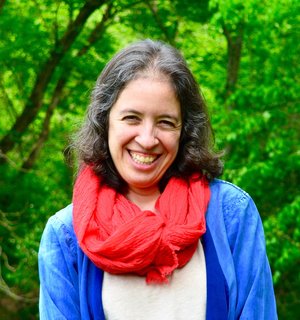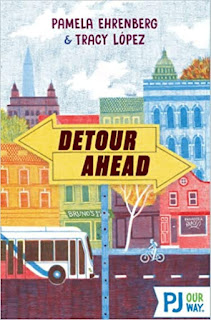 |
| Pamela Ehrenberg, photo by Alexandra Taylor |
Pamela Ehrenberg and Tracy López are the authors of the new middle grade novel Detour Ahead. Ehrenberg's other books include Queen of the Hanukkah Dosas. Ehrenberg lives in Washington, D.C., and López lives in West Virginia.
Q: How was your new novel's title chosen, and what does it signify for you?
Pamela: Someone at PJ Library came up with it—do you remember, Tracy? Our working title had been Riding the H4, but after it was pointed out that people outside D.C. might think it was more of a space alien/sci-fi-sounding kind of thing—I was very open to other ideas!
And of course, Detour Ahead works on so many levels—because so many of life’s best journeys happen on the detours.
Tracy: I had to search my email archives to find the answer because there were so many moving parts that I couldn't remember exactly how the new title came to be. It looks like the publisher emailed us in January 2021 and let us know they were considering a title change.
 |
| Tracy López |
I appreciated working with PJ Publishing because of their willingness to take our ideas into account when making decisions, and the title change was one of those times.
One of the titles I suggested was Gilah & Guillermo Take a Detour, and we also had an interesting discussion Pamela started about the word "transit" and what it means to be "in transit," like for public transportation and in life.
So then we played with some Metro-related titles like Expect Delays or Alternate Routes. In February we received an email from the publisher saying they had their team of kid reviewers look over some suggestions and they had chosen Detour Ahead.
As for what the title signifies to me—after the title was chosen we had a discussion about whether a detour is a positive or negative thing. Does it have any sort of connotation for most people?
At that time I said detours are neither negative or positive to me. One takes a detour when their original travel plan isn't working out, I guess ultimately that could cause some delays and seem like a negative thing, but it could also bring about opportunities like discovering a bakery or park you didn't know existed because you never take that route (or making a new friend!).
Q: Did you enjoy collaborating on the book?
Pamela: Totally. I have to say I’d given surprisingly little thought to the collaboration process before starting the outreach that eventually led to Tracy: the collaboration was just something needed to tell this particular story that was bigger than one human.
I had really given about zero thought to whether collaborating would be enjoyable—so it was a total surprise to realize what a difference it made, having someone else care as much about the book as I do—while we were writing it but also through all of the many detours of the publishing process and also now that it’s out in the world!
Tracy: I loved it, and was surprised by that. Back when the internet was Prodigy bulletin boards I sometimes participated in silly round-robin story-telling, which is the only collaborative writing I had done before this project.
Even though that was a positive experience I really hadn't anticipated how rewarding and enjoyable working with Pamela would be. I feel lucky that we had the opportunity to tell this story together and become friends in the process.
Q: Do you have any other favorite books for kids set in Washington, D.C.?
Pamela: Two recent ones come to mind from fellow members of the Children’s Book Guild: The Passover Guest, a picture book by Susan Kusel (illustrated by Sean Rubin), and Jayla Jumps In, a middle grade by Joy Jones.
I’d love to see even more—I think a lot of people are surprised to learn there are 700,000 actual people living here in D.C. The humanity of fictional characters can sometimes bring to life the abstract conversations that take place around statehood, rights, and representation for the human beings and families living here.
Tracy: A fun middle-grade book that takes place at the most famous residence in D.C. is Shaking Up the House by Yamile Saied Méndez. Like Pamela, I'd love to see more contemporary children's fiction that takes place in D.C. It makes a book extra special to the kids who know that story's setting as home.
Q: Did you know how the novel would end before you started writing it, or did you make many changes along the way?
Pamela: Well, we knew they had to end up as friends—I think their meeting kind of set the stage for that, and we knew Gilah was getting ready for her bat mitzvah, so that had to happen eventually.
We realized Guillermo would need some kind of event in his life to parallel that, but I think Tracy was a bit into writing his story before the poetry reading emerged.
So I guess we sort of knew some of the ending points—but as with detours—lots of changes along the way in how everyone got there.
And I think up ‘til the end, especially with the help of our incredible sensitivity readers, there were lots of changes in not so much what happened but in who the characters were in different moments—which parts of them got emphasized or de-emphasized to let them come more sharply into focus.
Tracy: I believe Pamela remembered that correctly because I never used to outline much before writing. I've reformed now because there's often a lot of wasted time and back-tracking when you write like that, but I think it served this particular project well not to have anything rigid in place.
Writing Detour Ahead was like an actual bus ride —we had a route of scheduled stops we knew we wanted to make, but there were unknown variables like everything we might see out the windows or who would join us on the bus, and I think we were both comfortable just enjoying the ride and seeing where it took us.
Q: Will you collaborate again on future books?
Pamela: No immediate plans…but if there’s one thing Guillermo and Gilah taught me, it’s to be open to unplanned/unexpected opportunities!
Q: Anything else we should know?
Pamela: I think a lot of readers might not know how much authors depend on the kindness of others at every stage of creating a book and then seeing it find its place in the world—other writers, advance readers with all sorts of perspectives, about a million different roles at the publisher, bloggers like Deborah, and of course readers like everyone reading this—it’s a bigger team effort than the number of names who can fit on the cover or even get squeezed into the acknowledgments. We’re so thankful for each of you!
I can be reached through my website at www.pamelaehrenberg.com , on Twitter at @PamelaEhrenberg, and on Facebook at @PamelaEhrenbergAuthor.
Tracy: I second all of that and would like to add that we're always happy to connect with our readers! I'm @tracydelopez on both Twitter and Instagram... Also, I had a lot of fun making things to go with the book, like a playlist, free printables including a scavenger hunt, and an educator's guide, so please feel free to check those out! And as always, thank you for reading!
--Interview with Deborah Kalb. Here's a previous Q&A with Pamela Ehrenberg.

Thank you so much for having me, Deborah, and for all that you do for our kidlit community!
ReplyDeleteYou're very welcome!
Delete